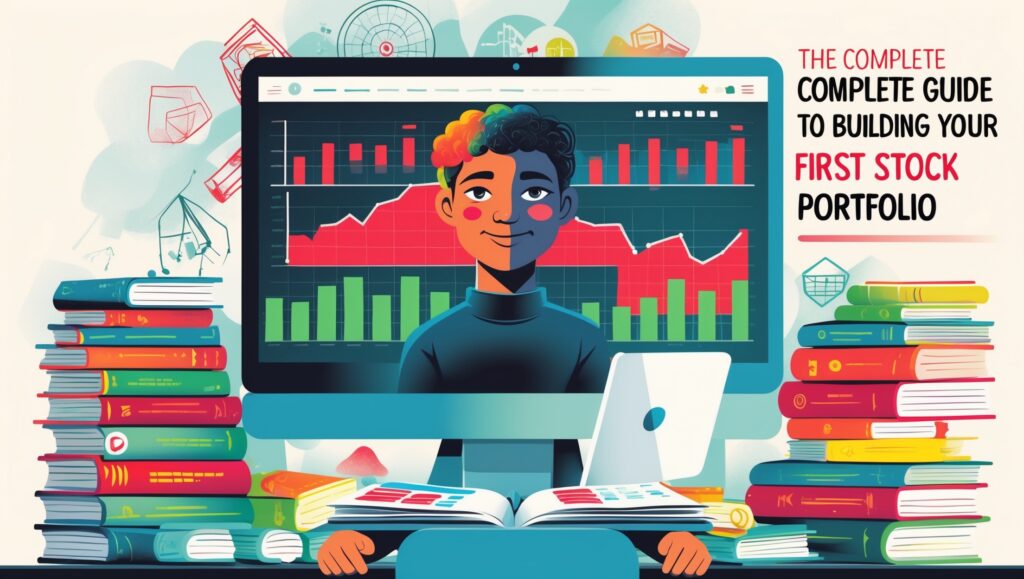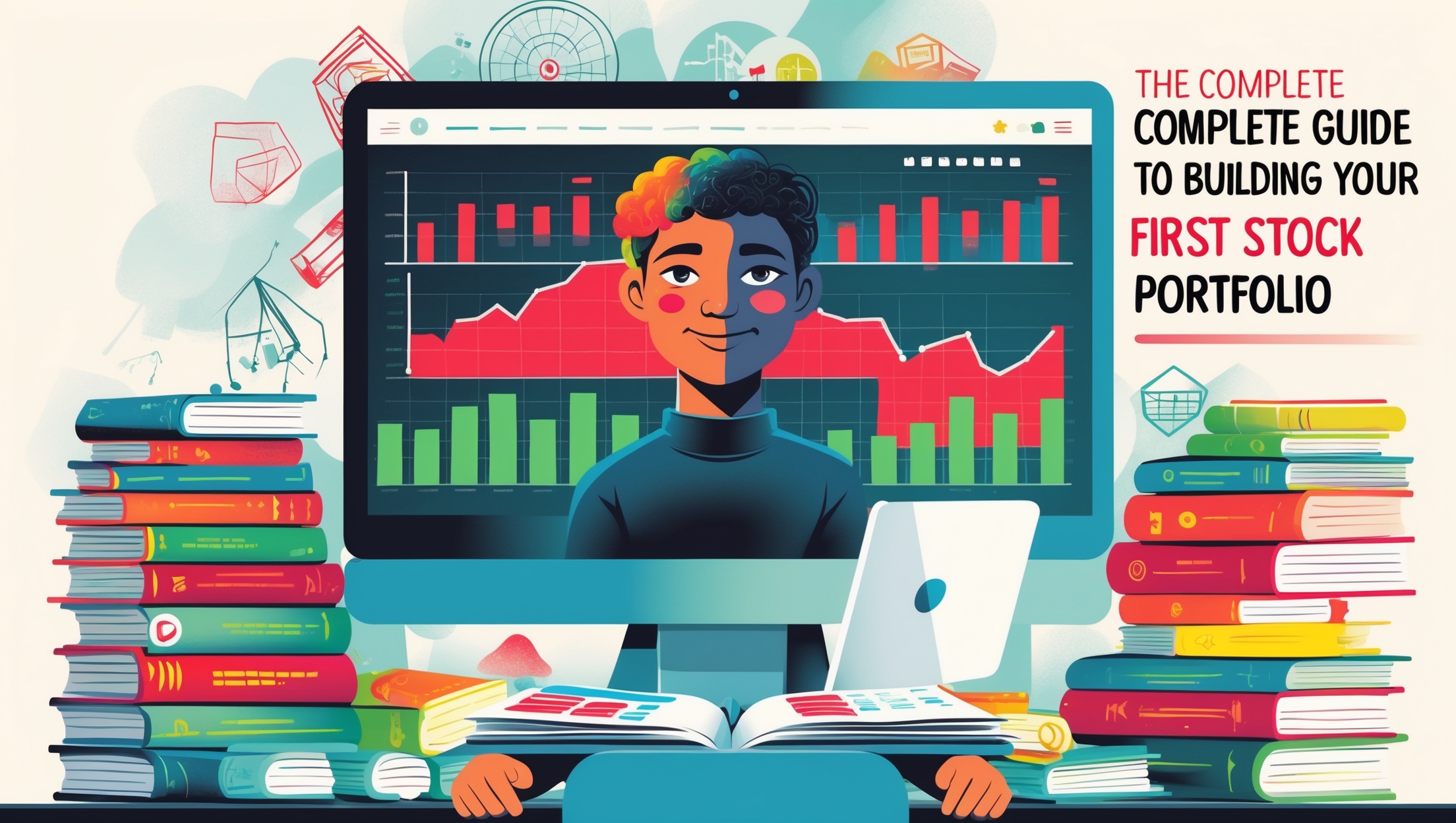The Complete Guide to Building Your First Stock Portfolio
The Complete Guide to Building Your First Stock Portfolio
When I first started investing, building a stock portfolio felt overwhelming. I didn’t know how many stocks to buy, how to diversify, or even where to start. If you’re a beginner, I want you to know that creating your first stock portfolio is easier than it seems.
In this guide, I’ll walk you through how I built my first portfolio, the platforms I use, and the system I follow to grow my account while paying bills every month. I explain this fully in my ebook 👉 How I Pay My Bills with Stocks

Table of Contents
Step 1: Choose Beginner-Friendly Platforms
The first step is picking a platform that’s simple and beginner-friendly. I started with Robinhood because it’s intuitive, commission-free, and perfect for learning without stress.
Sign up for Robinhood here 👉 Robinhood Free Stock
Later, I added Webull for more research and charting options, which helped me analyze stocks and track trends more effectively.
Grab your free stock on Webull here 👉 Webull Free Stock
Step 2: Fund Your Account
You don’t need a huge sum to start. I personally began with $100. Starting small allowed me to learn the process of buying, selling, and monitoring stocks without feeling overwhelmed.
Step 3: Decide How Many Stocks to Buy
As a beginner, I learned that diversification is important, but overcomplicating it can be confusing. I started with 3–5 stocks in different sectors to balance risk and growth.
Step 4: Choose Stocks You Understand
I focus on companies I know and use. It’s easier to analyze a company when you understand its products or services. Avoid hype or social media trends when selecting stocks.
Step 5: Use Tools to Make Smart Decisions
I rely heavily on TradingView start here to analyze charts, spot trends, and identify entry and exit points. Even as a beginner, it helps me make informed choices.
Step 6: Track Your Portfolio
Keeping a simple record of each stock, why I bought it, and its performance helps me make smarter decisions and avoid emotional trading.
Step 7: Build a System
One thing that changed everything for me was creating a system where I take a small percentage of my portfolio every month to pay bills while letting the rest grow.
I explain this fully in my ebook 👉 How I Pay My Bills with Stocks
Step 8: Monitor and Adjust
I review my portfolio regularly, but I don’t obsess over daily changes. Adjusting periodically allows me to rebalance risk and seize growth opportunities.
Step 9: Keep Learning
Even as a beginner, every trade and chart analysis teaches me something new. Using platforms like Robinhood, Webull, and TradingView accelerates my learning.
Final Thoughts
Building your first stock portfolio doesn’t have to be complicated. Start small, diversify, focus on companies you understand, and use the right tools. With patience and a consistent system, you can grow your portfolio and even generate income to cover bills.
✅ Start with Robinhood here: Robinhood Link
✅ Grab a free stock on Webull here: Webull Link
✅ Learn my full strategy in my ebook: Pay Bills with Stocks
One of the first things I learned is that you don’t need a lot of money to start building a portfolio. Even small amounts like $50 or $100 are enough to get started and learn how the market works.
I personally began with Robinhood sign up here because it’s beginner-friendly, intuitive, and commission-free. The platform allowed me to focus on learning without stress.
Later, I added Webull get your free stock here for more advanced charting tools and research options, which helped me make smarter choices and track trends.
I also rely heavily on TradingView start here to read charts, identify patterns, and determine potential entry and exit points. Even as a beginner, it makes analysis manageable.
Starting small and being consistent is more important than investing large sums at once. Regular small investments helped me build confidence and steadily grow my portfolio.
I keep a journal of why I bought each stock. This simple habit prevents emotional decisions and helps me stay disciplined, even when the market moves unpredictably.
Diversifying your investments is essential. I make sure not to put all my money into one stock. Spreading it across a few companies reduces risk while allowing for potential growth.
I treat my stock portfolio like a paycheck. Every month, I withdraw a small percentage to cover bills and groceries while leaving the rest invested to grow. My full system is explained in my ebook 👉 How I Pay My Bills with Stocks.
Avoid following hype or trends on social media. Focusing on researched, reliable companies has helped me build a portfolio that grows steadily over time.
Setting a consistent routine has been crucial. I check my accounts once or twice a day instead of obsessing over every price movement, which keeps me calm and focused.
You don’t need a finance degree to start. Patience, discipline, and beginner-friendly tools like Robinhood, Webull, and TradingView are enough to succeed.
Even small mistakes teach valuable lessons. I once bought a stock too early, but that experience helped me understand chart patterns and timing better.
Taking action is always better than waiting for the “perfect moment.” Open your account, fund it, and make your first trades—you’ll learn faster by doing than by overanalyzing.
Learning while doing is the key. Every trade, research session, and chart review builds your knowledge and confidence, turning the stock market from intimidating into manageable.
Finally, remember that starting with small, consistent steps builds long-term wealth. Focus on learning, using the right tools, and following a system, and even beginners can grow a meaningful stock portfolio.
I explain this fully in my ebook 👉 How I Pay My Bills with Stocks

Stay ahead in the stock market! Subscribe to our newsletter and receive exclusive stock flow reports, trading insights, and actionable tips directly in your inbox. Join thousands of traders who get our updates first.







